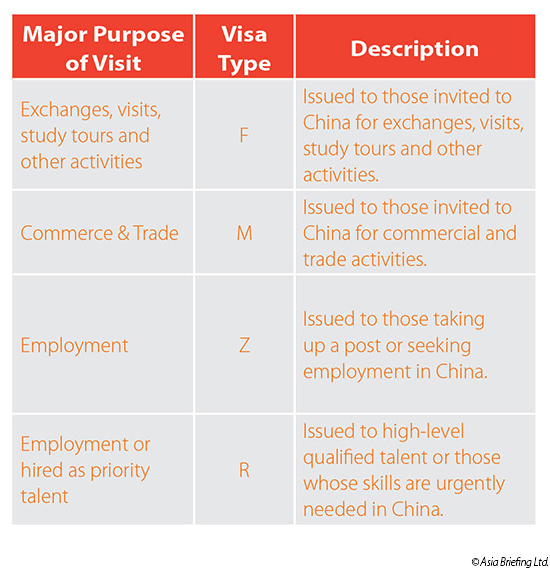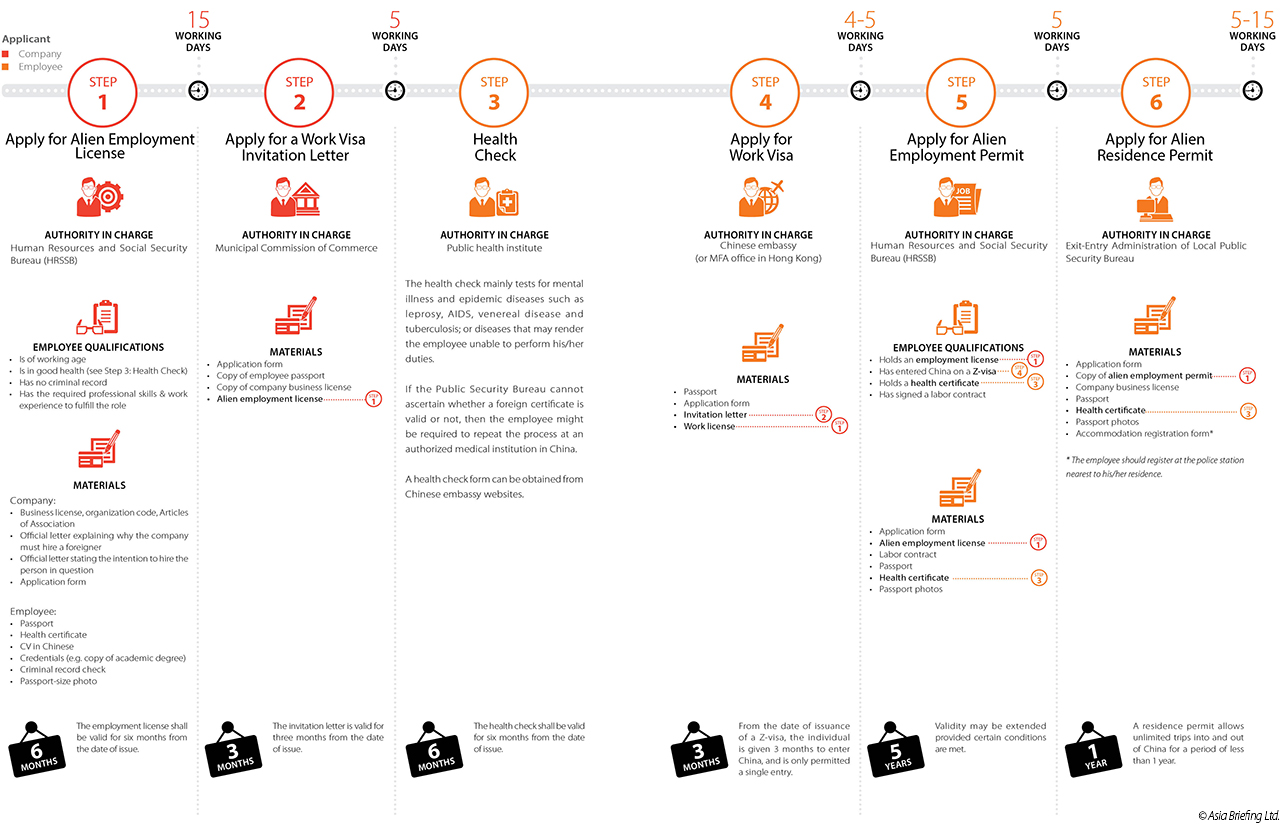Posted on January 20 2015
Employing Foreign Nationals in China: Visa Procedures
By , Editor
Updated April 03 2023
In September 2013, the Chinese government amended its visa regulations. The revised law mainly introduced a number of new visa categories, increasing the total number from eight to 12, and altered the scope of a few existing categories. In this section, we walk you through the most recent changes.
The F-visa, also known as a business visa, was previously used by foreign businesspeople visiting China on business but who were not employed by a Chinese entity. However, the new regulations have now limited its scope to non-commercial purposes only, such as cultural exchanges, visits and inspections. At the same time, the regulations introduced a new visa for business travelers called the M-visa. It is applicable to foreigners coming to the country for business and trade purposes of
no more than six months (180 days). Like the previous F-visas (business category), M-visas are most suitable for foreigners who will:
 Another new visa type is the R-visa, which is issued to foreign high level personnel and those with special talents in shortage in China. What is meant by ‘high-level personnel’ is not yet entirely clear, but this likely refers to a company’s senior management. So apart from the Z-visa, the R-visa can now also be used for employment purposes in China. Applicants for an R-visa need to satisfy more stringent requirements than for a regular Z-visa. These requirements and the documents needed are stipulated by local government authorities, and thus vary per locality.
Both the R and Z-visas are official work visas. For the time being, the Z-visa is the most common type used by foreigners working in China, and will likely remain so, considering the stricter requirements and remaining uncertainty regarding the R-visa.
An employee on a Z-visa needs to subsequently apply for a residence permit. The residence permit allows the foreigner to stay in China for the length of time as stipulated by the permit, usually one year. It also allows him/her an unlimited number of trips into and out of the country. With an M-visa (or the previous F-visa) this is not possible, and leaving the country often means having to reapply for a new visa.
The full procedure for obtaining a work visa (Type Z) is summarized in the chart below (click for large).
Another new visa type is the R-visa, which is issued to foreign high level personnel and those with special talents in shortage in China. What is meant by ‘high-level personnel’ is not yet entirely clear, but this likely refers to a company’s senior management. So apart from the Z-visa, the R-visa can now also be used for employment purposes in China. Applicants for an R-visa need to satisfy more stringent requirements than for a regular Z-visa. These requirements and the documents needed are stipulated by local government authorities, and thus vary per locality.
Both the R and Z-visas are official work visas. For the time being, the Z-visa is the most common type used by foreigners working in China, and will likely remain so, considering the stricter requirements and remaining uncertainty regarding the R-visa.
An employee on a Z-visa needs to subsequently apply for a residence permit. The residence permit allows the foreigner to stay in China for the length of time as stipulated by the permit, usually one year. It also allows him/her an unlimited number of trips into and out of the country. With an M-visa (or the previous F-visa) this is not possible, and leaving the country often means having to reapply for a new visa.
The full procedure for obtaining a work visa (Type Z) is summarized in the chart below (click for large).
 The new law also introduces the concept of a ‘private non-enterprise unit’. Foreigners working for such organizations need to apply for a Foreign Expert Certificate, instead of an Alien Employment Permit. We will go into more detail about these documents in the following pages. Depending on how the implementation of the new regulations proceed, foreigners working for ‘private non-enterprise units’ may soon have to apply for R-visas instead of Z-visas.
http://www.china-briefing.com/news/2015/01/14/employing-foreign-nationals-china-visa-procedures.html
The new law also introduces the concept of a ‘private non-enterprise unit’. Foreigners working for such organizations need to apply for a Foreign Expert Certificate, instead of an Alien Employment Permit. We will go into more detail about these documents in the following pages. Depending on how the implementation of the new regulations proceed, foreigners working for ‘private non-enterprise units’ may soon have to apply for R-visas instead of Z-visas.
http://www.china-briefing.com/news/2015/01/14/employing-foreign-nationals-china-visa-procedures.html
- Spend less than six months in China during any one calendar year
- Be frequently entering and leaving China
- Not hold a formal senior position at an entity based in China
- Not receive payment from a company incorporated in China
 Another new visa type is the R-visa, which is issued to foreign high level personnel and those with special talents in shortage in China. What is meant by ‘high-level personnel’ is not yet entirely clear, but this likely refers to a company’s senior management. So apart from the Z-visa, the R-visa can now also be used for employment purposes in China. Applicants for an R-visa need to satisfy more stringent requirements than for a regular Z-visa. These requirements and the documents needed are stipulated by local government authorities, and thus vary per locality.
Both the R and Z-visas are official work visas. For the time being, the Z-visa is the most common type used by foreigners working in China, and will likely remain so, considering the stricter requirements and remaining uncertainty regarding the R-visa.
An employee on a Z-visa needs to subsequently apply for a residence permit. The residence permit allows the foreigner to stay in China for the length of time as stipulated by the permit, usually one year. It also allows him/her an unlimited number of trips into and out of the country. With an M-visa (or the previous F-visa) this is not possible, and leaving the country often means having to reapply for a new visa.
The full procedure for obtaining a work visa (Type Z) is summarized in the chart below (click for large).
Another new visa type is the R-visa, which is issued to foreign high level personnel and those with special talents in shortage in China. What is meant by ‘high-level personnel’ is not yet entirely clear, but this likely refers to a company’s senior management. So apart from the Z-visa, the R-visa can now also be used for employment purposes in China. Applicants for an R-visa need to satisfy more stringent requirements than for a regular Z-visa. These requirements and the documents needed are stipulated by local government authorities, and thus vary per locality.
Both the R and Z-visas are official work visas. For the time being, the Z-visa is the most common type used by foreigners working in China, and will likely remain so, considering the stricter requirements and remaining uncertainty regarding the R-visa.
An employee on a Z-visa needs to subsequently apply for a residence permit. The residence permit allows the foreigner to stay in China for the length of time as stipulated by the permit, usually one year. It also allows him/her an unlimited number of trips into and out of the country. With an M-visa (or the previous F-visa) this is not possible, and leaving the country often means having to reapply for a new visa.
The full procedure for obtaining a work visa (Type Z) is summarized in the chart below (click for large).
 The new law also introduces the concept of a ‘private non-enterprise unit’. Foreigners working for such organizations need to apply for a Foreign Expert Certificate, instead of an Alien Employment Permit. We will go into more detail about these documents in the following pages. Depending on how the implementation of the new regulations proceed, foreigners working for ‘private non-enterprise units’ may soon have to apply for R-visas instead of Z-visas.
http://www.china-briefing.com/news/2015/01/14/employing-foreign-nationals-china-visa-procedures.html
The new law also introduces the concept of a ‘private non-enterprise unit’. Foreigners working for such organizations need to apply for a Foreign Expert Certificate, instead of an Alien Employment Permit. We will go into more detail about these documents in the following pages. Depending on how the implementation of the new regulations proceed, foreigners working for ‘private non-enterprise units’ may soon have to apply for R-visas instead of Z-visas.
http://www.china-briefing.com/news/2015/01/14/employing-foreign-nationals-china-visa-procedures.htmlTags:
Share
Options for you by Y-Axis
Get it on your mobile
Get News alerts
Contact Y-Axis

